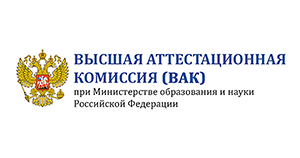|
Перейти
на сайт журнала "Врач" |
Перейти на сайт журнала "Медицинская сестра"
|
Перейти на сайт журнала "Фармация"
|
Перейти на сайт журнала "Молекулярная медицина"
|
Перейти на сайт журнала "Вопросы биологической, медицинской и фармацевтической химии"
|
Журнал включен в российские и международные библиотечные и реферативные базы данных
|
ВАК (Россия)
|
РИНЦ (Россия)
|
Эко-Вектор (Россия)
|
THE INFLUENCE OF THE COMPOSITION OF THE NUTRIENT ENVIRONMENT ON THE GROWTH AND BIOSYNTHETIC INDICATORS OF THE SUSPENSION CULTURE OF RODYOLA ROSE (RHODIOLA ROSEA L.)
DOI: https://doi.org/10.29296/25877313-2018-08-02
Issue:
8
Year:
2018
In this study a special attention was paid to a possible exogenous regulation of the biological productivity of the cell culture of Rhodiola rosea components of the nutrient medium. As a result of the experiments it was found that high growth and biosynthetic in-dicators of a suspension culture of Rhodiola rosea can provide nutritional content in the substrate nitrogen and potassium in the ratio of 0.60:0.40 for the shares the amounts taken per unit and expressed in mg-atoms. On the basis of the conducted experiments the to-tal optimum of five elements with the composition of macrosoma was calculated: nitrogen: phosphorus : potassium: calcium : magne-sium, which helps to maintain the productivity of suspension culture at high level. The carbohydrates are the basis of all nutrient media for the cultivation of cell cultures of plants. The possibility of increasing the amount of phenylpropanoids by introducing in the culture medium of sucrose or glucose at a concentration equal to 4 %. It was estab-lished that the components of mineral-based carbohydrates sucrose and glucose equally support the growth and upregulate biosyn-thetic activity in the suspension culture of Rhodiola rosea
Keywords:
suspension culture
mineral salts
carbohydrates
phenylpropanoid
References:
- Sravanthi M., Gottumukkala Krishna Mohan, Suryakala G., Sandhya Rani M. and Kalakotla Shanker. Plant tissue culture: An alternative for production of useful secondary metabolites // Journal of Pharmacognosy and Phytochemistry. 2016. V. 5. № 4. P. 269−272.
- . Mulabagal V., Tsay H.S. Plant cell cultures – An alternative and efficient source for the production of biologically im-portant secondary metabolites // International Journal of Ap-plied Science and Engineering. 2004. V. 2. № 1. P. 29−48.
- Vijayasree N., Udayasri P., Aswani K.Y., Ravi B.B., Phani K.Y., Vijay V.M. Advancements in the Production of Second-ary Metabolites // J. Nat. Prod. 2010. № 3. R. 112−123.
- Dornenburg H., Knorr D. Challenges and opportunities for metabolite production from plant cell and tissue cultures // Food Technology. 1997. № 51. R. 47−54.
- Ramachandra Rao S., Ravishankar G.A. Plant cell cultures: Chemical factories of secondary metabolites // Biotechnology Advances. 2002. № 20. R. 101−153.
- Savina T.A., Mjasnikova S.B., Balakina M.V. Optimizatsija uslovij vyraschivanija suspenzionnoj kul'tury rodioly rozovoj (Rhodiola rosea L.) // Voprosy biologicheskoj, meditsinskoj i farmatsevticheskoj himii. 2016. № 9. S. 21−26.
- Vahmistrov D.B. Razdel'noe opredelenie optimumov summarnoj dozy N+P+K i sootnoshenija N:P:K v udobre-nii // Agrohimija. 1982. № 4. S. 3−12
- Dospehov B.A. Metodika polevogo opyta: s osnovami statisticheskoj obrabotki rezul'tatov issledovanij. M.: Kniga po trebovaniju. 2013. 349 s.
- Tsybul'ko N.S., Savina T.A. Metodika kolichestvennogo opredelenija fenilpropanoidov v kletochnoj kul'ture Rhodiola rosea // Sbornik nauch. trudov Vseross. konf. s mezhdunar. uchastiem «Ot rastenija k preparatu: traditsii i sovremennost'», posv. 95-letiju A.I. Shretera. M.: GNU VILAR. 2014. C. 48−52








